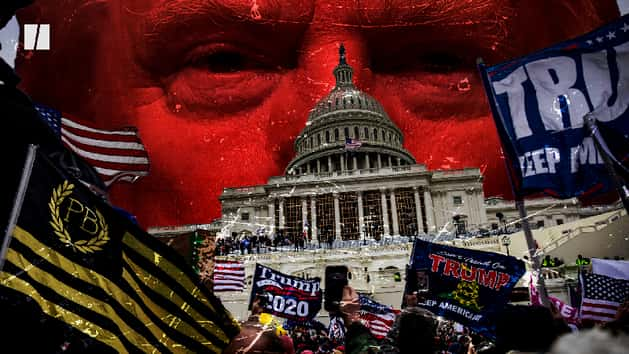LOADINGERROR LOADINGOn Jan. 6, 2021, Joseph Fischer allegedly entered the U.S. Capitol, along with more than 2,000 others, in the effort to stop the counting of the electoral votes that was already underway.Fischer wasn’t there in his official capacity as a police officer with the North Cornwall Township Police Department in Pennsylvania. He was there to, per text messages he sent that were later cited in a filing by Department of Justice lawyers, “take democratic congress to the gallows.”Advertisement
“Can’t vote if they can’t breathe..lol,” Fischer allegedly wrote in another text message about his plans before Jan. 6.Fischer, per federal charging documents, pushed his way into the building with yells of “Charge!” Once inside, he crashed into a line of police officers, according to a cell phone video he recorded. Fischer and at least one police officer were knocked to the ground. Police removed him four minutes later.Later identified by one of his coworkers, Fischer was arrested by federal officers on Feb. 19, 2021. He was charged with multiple felonies, but has still yet to go to trial. That’s because he’s appealed one of his charges all the way to the Supreme Court, which will hear arguments on April 16.The Supreme Court will hear a challenge to a law banning the obstruction of an official proceeding that has been used to charge 330 defendants who participated in the Jan. 6 insurrection.Kent Nishimura via Getty ImagesAdvertisement
At issue is a law that makes it a felony if someone “corruptly … obstructs, influences, or impedes any official proceeding, or attempts to do so.” This law — known as 18 U.S.C. 1512(c) — was enacted as part of the accounting reform law passed in 2002, in the wake of the Enron and Arthur Andersen scandals. Federal prosecutors have used it to charge 330 people who were involved in the Jan. 6 attack on the Capitol, including Fischer — and former President Donald Trump.Fischer argues in his appeal that the provision was not intended to be used in this way. Instead, he claims, a full reading of the law’s text shows that it was only meant to apply to the corrupt obstruction or impediment of documents in an official proceeding. This view revolves around the word “otherwise” in the provision, which reads (emphasis added):(c) Whoever corruptly—(1) alters, destroys, mutilates, or conceals a record, document, or other object, or attempts to do so, with the intent to impair the object’s integrity or availability for use in an official proceeding; or(2) otherwise obstructs, influences, or impedes any official proceeding, or attempts to do so,shall be fined under this title or imprisoned not more than 20 years, or both.The main points of contention that emerged in lower courts were how the word “otherwise” should be defined, and how it connects the first subsection to the second.Fourteen district court judges have upheld charges for obstru …
Article Attribution | Read More at Article Source
“Can’t vote if they can’t breathe..lol,” Fischer allegedly wrote in another text message about his plans before Jan. 6.Fischer, per federal charging documents, pushed his way into the building with yells of “Charge!” Once inside, he crashed into a line of police officers, according to a cell phone video he recorded. Fischer and at least one police officer were knocked to the ground. Police removed him four minutes later.Later identified by one of his coworkers, Fischer was arrested by federal officers on Feb. 19, 2021. He was charged with multiple felonies, but has still yet to go to trial. That’s because he’s appealed one of his charges all the way to the Supreme Court, which will hear arguments on April 16.The Supreme Court will hear a challenge to a law banning the obstruction of an official proceeding that has been used to charge 330 defendants who participated in the Jan. 6 insurrection.Kent Nishimura via Getty ImagesAdvertisement
At issue is a law that makes it a felony if someone “corruptly … obstructs, influences, or impedes any official proceeding, or attempts to do so.” This law — known as 18 U.S.C. 1512(c) — was enacted as part of the accounting reform law passed in 2002, in the wake of the Enron and Arthur Andersen scandals. Federal prosecutors have used it to charge 330 people who were involved in the Jan. 6 attack on the Capitol, including Fischer — and former President Donald Trump.Fischer argues in his appeal that the provision was not intended to be used in this way. Instead, he claims, a full reading of the law’s text shows that it was only meant to apply to the corrupt obstruction or impediment of documents in an official proceeding. This view revolves around the word “otherwise” in the provision, which reads (emphasis added):(c) Whoever corruptly—(1) alters, destroys, mutilates, or conceals a record, document, or other object, or attempts to do so, with the intent to impair the object’s integrity or availability for use in an official proceeding; or(2) otherwise obstructs, influences, or impedes any official proceeding, or attempts to do so,shall be fined under this title or imprisoned not more than 20 years, or both.The main points of contention that emerged in lower courts were how the word “otherwise” should be defined, and how it connects the first subsection to the second.Fourteen district court judges have upheld charges for obstru …nnDiscussion:nn” ai_name=”RocketNews AI: ” start_sentence=”Can I tell you more about this article?” text_input_placeholder=”Type ‘Yes'”]

